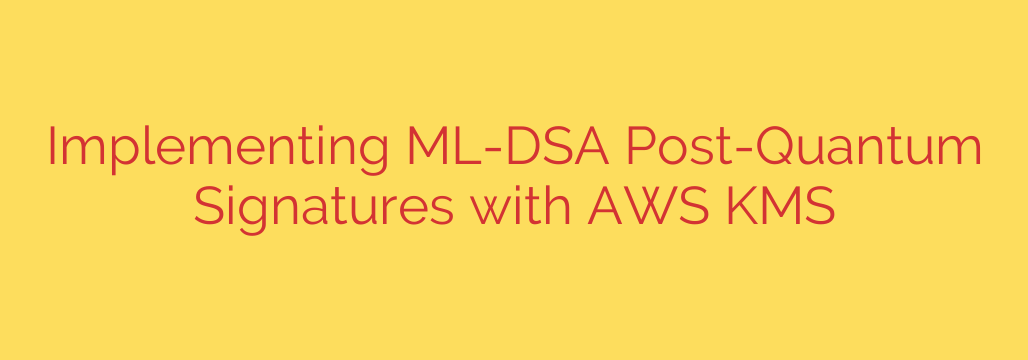
As the era of powerful quantum computers approaches, there’s a critical need to adopt new cryptographic methods capable of withstanding quantum attacks. One significant area is digital signatures, which are fundamental to verifying identity and ensuring data integrity in countless applications, from secure communications to software updates and financial transactions. Standard signature algorithms like ECDSA and RSA are vulnerable to attacks from quantum computers.
This necessitates a transition to post-quantum cryptography (PQC). Among the algorithms selected by NIST for standardization is ML-DSA (formerly known as Dilithium), a lattice-based signature scheme designed specifically to be resistant to quantum algorithms while remaining efficient on classical computers. Implementing these new algorithms requires careful consideration, especially when managing cryptographic keys securely.
A managed key management service like AWS Key Management Service (KMS) offers a robust solution for handling the complexities of cryptographic operations. AWS KMS now supports the generation, storage, and use of ML-DSA keys, simplifying the adoption of these post-quantum signatures. By integrating ML-DSA support into a widely used cloud service, developers can leverage the security and operational benefits of KMS while preparing their applications for the post-quantum future.
Using AWS KMS for ML-DSA operations means you can manage your ML-DSA signing keys within a FIPS 140-2 validated hardware security module (HSM) environment. This provides a higher level of security compared to managing keys in application code or less secure environments. The service handles the intricate key management lifecycle, including key generation, rotation, and deletion, reducing the operational burden on engineering teams.
Implementing ML-DSA signatures with AWS KMS involves creating an ML-DSA asymmetric signing key within KMS. Applications can then call the KMS API to sign data using this key and verify signatures using the corresponding public key. This approach abstracts away the low-level cryptographic details, allowing developers to focus on integrating the signature functionality into their workflows securely.
The move to post-quantum algorithms like ML-DSA is a crucial step in building systems that will remain secure against future threats. Leveraging a managed service like AWS KMS facilitates this migration by providing a secure, scalable, and compliant platform for managing the necessary cryptographic keys and performing signing operations. Adopting ML-DSA with AWS KMS helps organizations strengthen their security posture and ensure the long-term integrity of their digital signatures in anticipation of quantum computing advancements.
Source: https://aws.amazon.com/blogs/security/how-to-create-post-quantum-signatures-using-aws-kms-and-ml-dsa/








